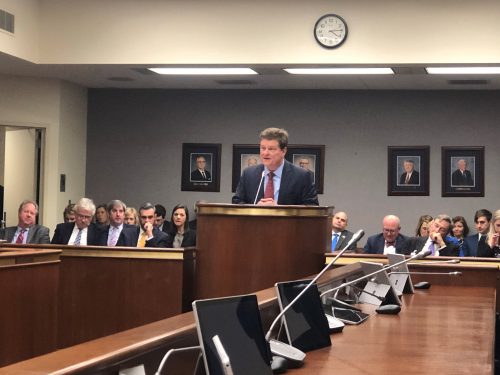Certificate of Need Hearing Fireworks
Palmetto Promise Institute’s Dr. Oran Smith testified this week before the South Carolina House Medical, Municipal and Military Committee on S.164, the repeal of the Certificate of Need (CON) statute. The following is taken from the testimony prepared for that hearing.
The History of Certificate of Need (CON)
The National Health Planning and Resource Development Act (1974) incentivized states to pass Certificate of Need (CON) laws with the goals of containing costs, providing more charity care, and preventing overinvestment. 49 states complied by 1980. When the CON provision was repealed in 1987, 11 states quickly repealed their CON laws. But advocates of the status quo dug in. A total of 15 states representing 40% of the US Population have repealed CON.
CON Repeal is a Bipartisan Issue
- The U.S. Department of Justice’s Antitrust Division and the Federal Trade Commission under President Obama said: “CON laws, when first enacted, had the laudable goals of reducing healthcare costs and improving access to care. However, after considerable experience, it is now apparent that CON laws can prevent the efficient functioning of healthcare markets in several ways that may undermine those goals… For these reasons…the Agencies historically have suggested that states consider repeal or retrenchment of their CON laws, and in this case, respectfully suggest that South Carolina repeal its CON laws.”
- “Three prominent members of the Trump administration called on individual states to eliminate Certificate of Need (CON) laws regarding the development of new healthcare facilities… Writing in a sweeping, nearly 120-page report on healthcare reform, the secretaries of the Health and Human Services, Treasury, and Labor department accused states of holding back innovation in healthcare with the laws.”
- In 2022, the SC Senate passed a CON Repeal bill 35-6. In 2023, the margin was 30 in favor, 6 opposed, 1 abstention, and 9 not present due to leave. There are 30 Republicans and 16 Democrats in the South Carolina Senate.
CON Means Delays of Needed Healthcare Capital Projects
- Roper St. Francis Berkeley was delayed eleven years until it began seeing patients in 2019. The region has grown by 115,000 people 2010-2020. Since 2010, Berkeley County has grown 33% and Dorchester 20%.
- Piedmont Medical Center Fort Mill opened in September 2022 twenty years after it filed its first CON application. Fort Mill’s population tripled since 2000 and unincorporated areas like Baxter and Indian Land have grown at an even higher rate. York and Lancaster Counties grew by 77,000 people 2010-2020.
- MUSC Indian Land. Application #2792 was accepted June 26, 2020. It has been appealed by competitors.
- Horry County. Horry County’s population has grown by 400% since 1970—73,000 people in the last ten years alone. Yet over $400 million in needed facilities for Horry County are currently contested by the other providers in the county.
- Currently, at total of $725 million in investment is stranded in the booming counties of Berkeley, Beaufort, Horry, and Lancaster. All of these delays affect rural areas as well as urban. All these delays mean higher construction costs and already too small facilities when construction begins.
The Rural Question
The most comprehensive study of the relationship of rural healthcare and CON or “entry regulation” was published by Thomas Stratman and Christopher Koopman in 2016. They found that CON laws were correlated with decreases in rural access. There is not a single paper that finds evidence that CON laws increase access to healthcare for rural or indigent residents.
This is actually consistent with South Carolina’s experience, because a large percentage of in-county residents in rural counties are already leaving the county for outpatient procedures but still going to the emergency room within the county. An in-county Ambulatory Surgery Center (ASC) could lure residents back to the county for surgery with the accompanying labs, imaging, physical therapy services. If hospitals work with physicians to build ASCs, the hospitals could receive revenue from returning patients.
National Healthcare Access Rankings
- In Ambulatory Surgery Centers Per Capita, South Carolina is at 35th, ranked below our neighbors Georgia (2), Florida (17), and Tennessee (19). Becker’s.
- In Orthopaedic Ambulatory Surgery Centers, South Carolina is ranked 38th, behind our neighbors Florida (13), Tennessee (20), George (35) and even Mississippi (21).
- According to the Lown Institute Hospitals Index, non-profit hospitals in South Carolina pay less than the value of their tax exemptions by $108 million.
- According to a RAND Corporation study of Health Care Prices Paid by Private Health Plans (2020), South Carolina is #2 in the United States for in-patient prices, #3 for outpatient prices, and #2 in overall private prices paid relative to Medicare prices paid.
The Experience of Florida
In 2019, Florida Eliminated permitting requirements for hospitals’ expansions of facilities and services, such as additional types of surgeries, organ transplantation, and neonatal care and Eliminated CON requirements for specialty hospitals, such as children’s and women’s hospitals, psychiatric units, and substance abuse hospitals.
According to the James Madison Institute in Florida, south Florida and central Florida had been struggling with a shortage of healthcare resources. In Trinity and in Wesley Chapel, Florida, lifting of CON in 2019 has allowed the building of new facilities in these areas opening in 2022. James Madison has been tracking the effect of CON repeal in Florida. We will be discussing the Florida healthcare boom on our podcast this week!






